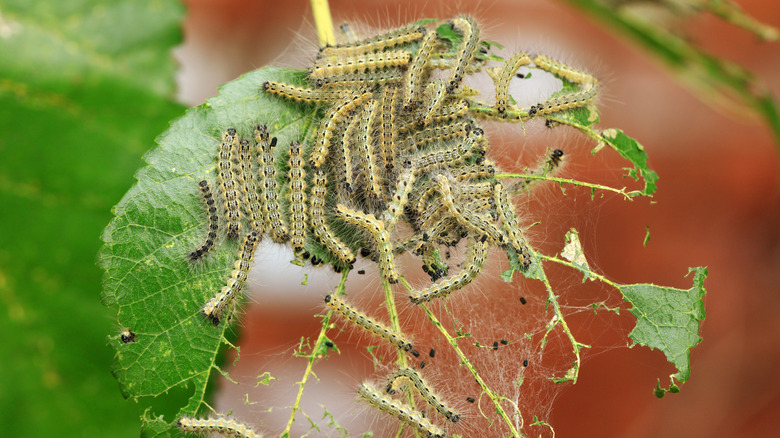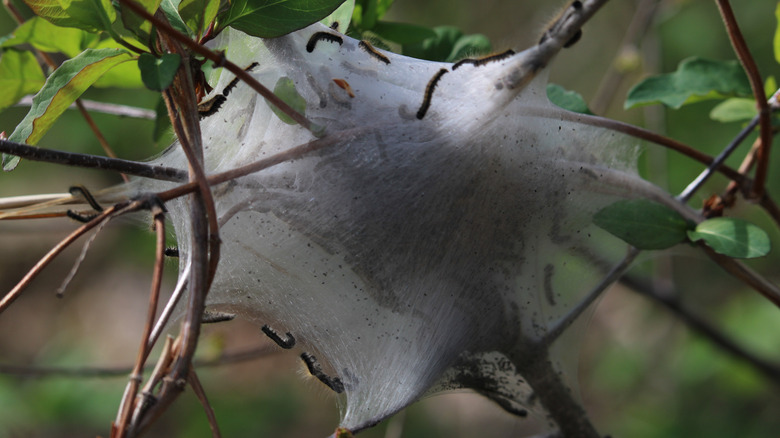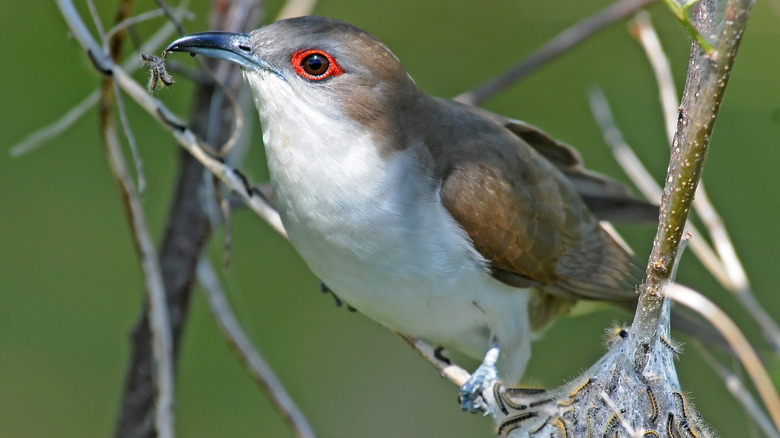How To Keep Webworms Out Of Your Garden
Imagine you're walking through your beautiful garden. Suddenly you notice something odd. You look around, analyzing your surroundings like Jodie Foster in the climactic scene of "Silence of the Lambs." You shift your attention to the trees and think to yourself that it's a little too early to be decorating for Halloween as strange silky webs hang down from their branches. You begin to slowly approach and realize that these aren't decorations at all. There are things moving inside it... worm-like things, and what you have just encountered is a nest of webworms.
Webworms are caterpillars that tirelessly spin their gossamer homes amidst tree branches and foliage. Their nests can cover as wide as 7 feet across while they themselves are only about an inch in size. Born from the eggs of white moths, these small caterpillars are like the construction workers of the insect world, but instead of hard hats and blueprints, they come equipped with bristly hair and a voracious appetite.
These tiny builders like to get straight to work weaving a silken fortress around themselves. But this fortress is more than just a home — it's an all-you-can-eat buffet, and they can be destroying your garden. If you find a couple of nests, it may be safe to just leave them on their own, as their nests won't last throughout the winter. But if you're dealing with a full-blown infestation, there are steps you can take to prevent and eliminate these pests.
Some easy ways of dealing with a webworm problem
Although not harmful to people, they can cause some unsightly damage to your trees. Your best bet, initially, is to break open the nests using a large stick and twist; what you'll get is a cotton-candy-looking barrel of webworms just like the one Shrek gave to Fiona. If being a part of film references doesn't interest you, and you want chemical warfare against these invaders, try using neem oil. It's an organic insecticide and does the job; just be careful, as it will also kill other insects that may be helpful to your ecosystem as well.
How about trying something less dramatic and more convenient, like using household products you most likely already have? Take vegetable oil, for example, as a cost-effective way to get rid of webworms. Just fill up a spray bottle and spray it onto the nest; it should seep right through that fortress. However, be careful when using any type of oil, especially in sunny spots or in high temperatures, as it can cause burn on your foliage. Lastly, the tried and true backup you can always count on is dish soap. Take out that spray bottle again, fill it up with 1 gallon of water, drop 3 tablespoons of dish soap into it, mix it but not too much because you don't want suds, and then simply spray on!
Natural predators & long-term prevention
Taking a step beyond immediate remedies, let's explore the world of beneficial predators and prevention strategies for long-term garden health. Yes, you heard it right -– not all bugs are bad!
Nature has its own efficient pest control squad, which includes a variety of birds, parasitic wasps, ladybugs, and black ants that love to snack on webworms. Attracting these helpful creatures to your garden can provide an ongoing line of defense. Bird feeders, bird baths, and insect-friendly plants can turn your garden into a natural pest control hub.
On a more preventative note, look out for egg-laden leaves at the start of the spring or fall season. Plucking and disposing of these can keep future generations of webworms from even getting a start.
Combining immediate remedies, long-term prevention, and nature's own pest controllers ensures a powerful defense strategy against the onslaught of webworms. Keep a vigilant eye on your leafy kingdom, introduce some friendly allies, and wield your garden tools wisely. Your green fortress will stand strong, and your lush paradise will continue to flourish. Here's to healthy, thriving gardens and to us being the guardians of our own green kingdoms!


